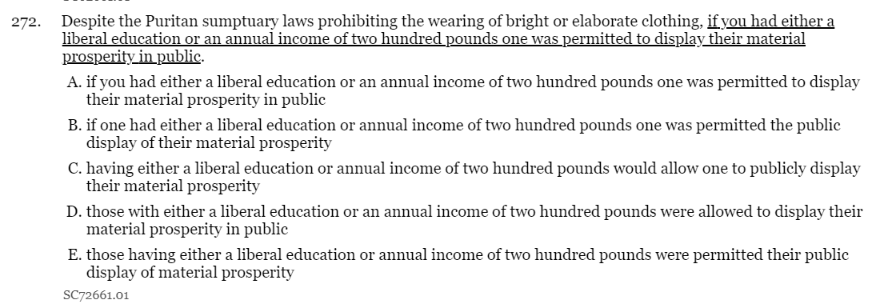Events & Promotions
|
|

GMAT Club Daily Prep
Thank you for using the timer - this advanced tool can estimate your performance and suggest more practice questions. We have subscribed you to Daily Prep Questions via email.
Customized
for You
Track
Your Progress
Practice
Pays
Not interested in getting valuable practice questions and articles delivered to your email? No problem, unsubscribe here.
- Nov 20
07:30 AM PST
-08:30 AM PST
Learn what truly sets the UC Riverside MBA apart and how it helps in your professional growth - Nov 22
11:00 AM IST
-01:00 PM IST
Do RC/MSR passages scare you? e-GMAT is conducting a masterclass to help you learn – Learn effective reading strategies Tackle difficult RC & MSR with confidence Excel in timed test environment - Nov 23
11:00 AM IST
-01:00 PM IST
Attend this free GMAT Algebra Webinar and learn how to master the most challenging Inequalities and Absolute Value problems with ease. - Nov 25
10:00 AM EST
-11:00 AM EST
Prefer video-based learning? The Target Test Prep OnDemand course is a one-of-a-kind video masterclass featuring 400 hours of lecture-style teaching by Scott Woodbury-Stewart, founder of Target Test Prep and one of the most accomplished GMAT instructors.
D
Be sure to select an answer first to save it in the Error Log before revealing the correct answer (OA)!
Difficulty:
 15%
(low)
15%
(low)
Question Stats:
81% (01:34) correct 19%
(01:46)
wrong
19%
(01:46)
wrong  based on 3519
sessions
based on 3519
sessions
History
Date
Time
Result
Not Attempted Yet
Despite the Puritan sumptuary laws prohibiting the wearing of bright or elaborate clothing, if you had either a liberal education or an annual income of two hundred pounds one was permitted to display their material prosperity in public.
(A) if you had either a liberal education or an annual income of two hundred pounds one was permitted to display their material prosperity in public
(B) if one had either a liberal education or annual income of two hundred pounds one was permitted to display their material prosperity in public
(C) having either a liberal education or annual income of two hundred pounds would allow one to publicly display their material prosperity
(D) those with either a liberal education or an annual income of two hundred pounds were allowed to display their material prosperity in public
(E) those having either a liberal education or an annual income of two hundred pounds were permitted their public display of material prosperity
SC62661.01

2022-04-30_13-43-06.png [ 91.2 KiB | Viewed 12373 times ]
(A) if you had either a liberal education or an annual income of two hundred pounds one was permitted to display their material prosperity in public
(B) if one had either a liberal education or annual income of two hundred pounds one was permitted to display their material prosperity in public
(C) having either a liberal education or annual income of two hundred pounds would allow one to publicly display their material prosperity
(D) those with either a liberal education or an annual income of two hundred pounds were allowed to display their material prosperity in public
(E) those having either a liberal education or an annual income of two hundred pounds were permitted their public display of material prosperity
SC62661.01
Show SpoilerScreenshot from Verbal Review 2021
Attachment:
2022-04-30_13-43-06.png [ 91.2 KiB | Viewed 12373 times ]
Kudos
Bookmarks
Despite the Puritan sumptuary laws prohibiting the wearing of bright or elaborate clothing, if you had either a liberal education or an annual income of two hundred pounds one was permitted to display their material prosperity in public.
Quote:
At first glance, this has a pronoun issue with "one" and "you", which is shifting throughout the sentence. Consistency is necessary. "Their" is also the incorrect number for "one" or "you".
Quote:
"Their" is also the incorrect number for "one" or "you".
Quote:
"Their" is also the incorrect number for "one" or "you".
Quote:
Correct.
Quote:
Changes the meaning a bit.... "permitted to" vs. "permitted".
BillyZ

Current Student
Joined: 14 Nov 2016
Last visit: 03 May 2025
Posts: 1,143
Given Kudos: 926
Location: Malaysia
Concentration: General Management, Strategy
Schools: Sloan '23 (D) Tuck '23 (D) Darden '23 (D) Ross '23 (D) Kellogg '23 (D) Wharton '23 (D) Booth '23 (D) Fuqua '24 (A) Harvard '24 (D) Stanford '24 (D)
GMAT 1: 750 Q51 V40 (Online)

GPA: 3.53
Schools: Sloan '23 (D) Tuck '23 (D) Darden '23 (D) Ross '23 (D) Kellogg '23 (D) Wharton '23 (D) Booth '23 (D) Fuqua '24 (A) Harvard '24 (D) Stanford '24 (D)
GMAT 1: 750 Q51 V40 (Online)

Posts: 1,143
Kudos
Bookmarks
generis
Small Folk: A Celebration of Childhood in America Hardcover – January 1, 1980
by Sandra Brant (Author), Elissa Cullman (Author)
Attachments
Annotation 2019-05-01 220449.jpg [ 52.67 KiB | Viewed 34008 times ]













